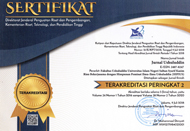The Use Of Hermeneutics Double Movement Fazlur Rahman In Comprehending Hadith Of The Unsuccessful Leadership Of Women
Abstract
Keywords
Full Text:
PDFReferences
Abdullah, M Amin. Islamic Studies di Perguruan Tinggi, Pendekatan Integratif-Interkonektif. Yogyakarta: Pustaka Pelajar, 2012.
Alfitri, Alfitri. “Women’s Rights and Gender Equality Issues in Islamic Law in Indonesia: The Need To Re-Read Women’s Status In The Islamic Religious Texts.” Mazahib 13, no. 1 (2014).
Armita, Pipin, dan Jani Arni. “Dinamika Pemahaman Ulama tentang Hadis Dajjal (dari Interpretasi Tekstual Ke Interpretasi Kontekstual).” Jurnal Ushuluddin 25, no. 2 (2017): 208–220.
Asqalāni, Ibn Hajar al-. Fath al-Bāri, juz 8. Qahirah: Mustafā al-Bābi al-Halab, t.t.
Bay, Kaizal, dan Sri Chalida. “REINTERPRETASI TERHADAP PEMAHAMAN HADITS-HADITS TENTANG GENDER DALAM PERSPEKTIF FIQH AL-HADITS.” Jurnal Ushuluddin 24, no. 1 (2016): 37–50.
Blackburn, Susan. “Indonesian Women and Political Islam.” Journal of Southeast Asian Studies 39, no. 1 (2008): 83–105.
Bukhari, ‘Abd Allah Muhammad ibn Isma‘il al-. Shahih al-Bukhari. Juz 4. Beirut: Dar al-Fikr, t.t.
Fadli, ‘Abd al-Hādi al-. Mukhtasaru an-Nahwi. Jedah: Dār al-Syurūq, 1980.
Fāris, ‘Abd al-Qādir Abū. al-Nizām al-Siyāsi fî al-Islām, 1984.
Fudhaili, Ahmad. Perempuan di Lembaran Suci, Kritik atas Hadis-Hadis Shahih. Jakarta: Kementerian Agama RI, 2012.
Hamka, Husain. “Kepemimpinan Perempuan dalam Era Modern.” Al-Qalam 19, no. 1 (2016): 107–116.
Iqshari, Tsuriyah. al-Imāmah al-Siyāsiyyah li al-Mar’ah, Dirāsah Naqdiyyah Haditsiyyah. al-Maghrib: Ifriqya asy-Syarq, 2017.
Khoirin, Nur. Telaah Terhadap Otensititas Hadits-Hadist Misogini. Yogyakarta: Kerjasama Mc Gill Project, Departemen Agama RI, dan IAIN Sunan Kalijaga, 2017.
Kurdi, dkk. Hermeneutika al-Qur’an dan Hadis. Yogyakarta: eLSAQ Press, 2010.
Lajnah Pentashihan Mushaf al-Qur’an. Tafsir al-Qur’an Tematik. Jilid 3. Jakarta: Kamil Pustaka, 2014.
Ma’shumah, Lift Anis. “Teks-teks keislaman dalam kajian feminisme muslim: Telaah metodologis atas pandangan feminis muslim terhadap penciptaan dan kepemimpinan perempuan.” Sawwa: Jurnal Studi Gender 7, no. 2 (2012): 67–90.
Moghadam, Valentine M., dan Fatemeh Haghighatjoo. “Women and Political Leadership in an Authoritarian Context: A Case Study of the Sixth Parliament in the Islamic Republic of Iran.” Politics & Gender 12, no. 01 (Maret 2016): 168–97. https://doi.org/10.1017/S1743923X15000598.
Muhammad, Husein. Fiqh Perempuan, Refleksi Kiai atas Tafsir Wacana Agama dan Gender. Yogyakarta: Ircisod, 2019.
Muqtada, Muhammad Rikza. “Kritik Nalar Hadis Misoginis.” Musãwa Jurnal Studi Gender dan Islam 13, no. 2 (2014): 87–98.
Mustaqim, Abdul. Epistemologi Tafsir Kontemporer. Yogyakarta: eLKIS, 2011.
Muttaqin, Labib. “Aplikasi Teori Double Movement Fazlur Rahman Terhadap Doktrin Kewarisan Islam Klasik.” Al-Manahij: Jurnal Kajian Hukum Islam 7, no. 2 (2013): 195–206.
Ni’mah, Fuād. Mulakhkhas Qawāid al-Lughah al-‘Arabiyyah, juz 1. Beirūt: Dār ats-Tsaqāfah al-Islāmiyyah, tt.
Novianti, Ida. “Dilema kepemimpinan perempuan dalam Islam.” Yin Yang 3, no. 2 (2008): 255–261.
Obermeyer, Carla Makhlouf. “Islam, Women, and Politics: The Demography of Arab Countries.” Population and Development Review 18, no. 1 (1992): 33–60. https://doi.org/10.2307/1971858.
Rahman, Fazlur. Islam and Modernity, Transformation of an Intellectual Tradition. Chicago: The University of Chicago Press, 1982.
———. Tema-tema Pokok al-Qur’an terj. dari Bahasa Inggris oleh Erfan Nurtawab dan Ahmad Baiquni. Bandung: Mizan, 2017.
Sanāni, Muhammad ibn Ismāîl al-. Subul al-Salām, juz 4. Bandung: Maktabah Dahlan, t.t.
Shihab, M. Quraish. Membumikan al-Qur’an, Fungsi dan Peran Wahyu dalam Kehidupan Masyarakat. Bandung: Mizan Pustaka, 2007.
Sholeh, Ahmad Syukri. Metodologi Tafsir Al-Qur’an Kontemporer dalam Pandangan Fazlur Rahman. Jakarta: Gaung Persada Press, 2007.
Subhan, Zaitunah. Al Qur’an & Perempuan Menuju Kesetaraan Gender Dalam Penafsiran. Jakarta: Prenanda Media Group, 2015.
Sumantri, Rifki Ahda. “Hermeneutika Al-Qur’an Fazlur Rahman Metode Tafsir Double Movement.” Komunika: Jurnal Dakwah dan Komunikasi 7, no. 1 (2013).
Syamsuddin, dkk, Sahiron. Hermeneutika al-Qur’an Mazhab Jogja. Yogyakarta: Islamika, 2003.
Syamsuddin, Sahiron. Hermeneutika dan Pengembangan Ulumul Qur’an. Yogyakarta: Pesantren Nawesea Press, 2017.
Ulya, Atiyatul. “Kritik kualitas matan hadis perempuan lemah akalnya perspektif salahudin Ibn Ahmad Al-Adlabi.” Jurnal Ushuluddin 26, no. 1 (2018): 57–68.
Yuslem, Nawir. “Kontekstualisasi Pemahaman Hadis.” Miqot: Jurnal Ilmu-ilmu Keislaman 34, no. 1 (2010)
DOI: http://dx.doi.org/10.24014/jush.v27i2.6719
Refbacks
- There are currently no refbacks.
 Jurnal Ushuluddin Indexed By:
Jurnal Ushuluddin Indexed By:
Alamat Redaksi:
 Fakultas Ushuluddin UIN SUSKA Riau Jl. H.R. Soebrantas KM. 15,5 Panam – Pekanbaru
Fakultas Ushuluddin UIN SUSKA Riau Jl. H.R. Soebrantas KM. 15,5 Panam – Pekanbaru
 E-mail: jurnal.ushuluddin@uin-suska.ac.id
E-mail: jurnal.ushuluddin@uin-suska.ac.id
ejournal: http://ejournal.uin-suska.ac.id/index.php/ushuludin

Jurnal Ushuluddin is licensed under a Lisensi Creative Commons Atribusi 4.0 Internasional.

















